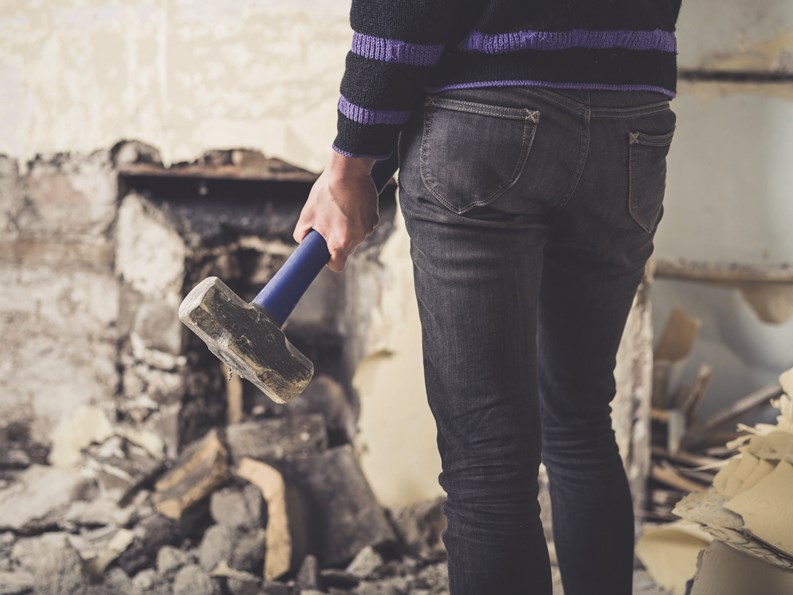It’s no secret that residents in co-ops or condos can be a fickle bunch, and many times decide to undertake a repair or remodeling project themselves, without going through the proper channels.
Maybe it’s a new owner who wants to make major changes to his home to make it a better fit; perhaps it’s a long-time resident who buys an adjacent unit and wants to knock down some walls to make one big unit; or an owner could just be sick and tired of his flooring and wants to do something new.
In each of these scenarios, the first step should always be petitioning the board for permission, but often, people get tired of waiting for a response and decide to forge ahead and hire contractors themselves. This can lead to numerous problems.
“In dealing with renovation requests, the board is engaging in a balancing act between the clear benefits of renovation to the risk of the building,” Bruce Cholst, a partner with New York City-based law firm Rosen Livingston & Cholst LLP. “Risks could be damage, disturbance and the prospect of legal liability.”
Howard L. Zimmerman, AIA, founder and principal of Howard L. Zimmerman Architects, P.C., says each building should have a proper building alteration agreement in place.
“The board lays out what has to be filed; what the contractor qualifications are; what the hours of working are; and whether to file with municipality or not,” he says. “There should be house rules regarding the hours worked and whether weekends are included. What time of night? Whether you can cut through walls and what protections are offered.”
Setting the Rules
The objective of the board is they are there to protect the infrastructure of the property, which is why Zimmerman says things such as drilling through a wall and removing sound insulation can be a concern.
“If you’re going to be using a significant amount of electricity, does that suck the power from other buildings in the complex? That’s also a concern,” he says. “Are you going to alter the look of the roof or the façade? That’s a concern.”
Cholst says two things a board can do in course of regulation, are devise an alteration policy with the minimal standards required for any project and make an alteration agreement that all residents must sign agreeing to all terms written.
“It should be a living document. Every time the building has an experience that’s not covered specifically by the alteration policy, it should be incorporated and updated,” he says.
When it comes to the requirements boards should set for shareholder/owners wishing to alter their apartments, James A. Slowikowski, a partner with the law firm of Dickler, Kahn, Slowikowski & Zavell, Ltd. in Chicago, notes there are some guidelines every board tends to follow.
“Any board should develop rules that will cover those remodeling situations and part of that there are things that should definitely be provided to them including any plans, drawings, specifications and all details on the proposed alteration. They will want contractor information, contractor’s liability insurance information, if it involves something that involves a licensed trade, they’ll want licensing, and it’s not a bad idea, but a lot will want a hold harmless and indemnification from the owner that they won’t hold the association liable if during the course of the work there’s damage or injury,” says Slowikowski.
Failure to comply with any of the condominium’s governing documents shall be grounds for an action to recover sums due, for damages or injunctive relief.
Put it in Writing
A building or association’s legal counsel can easily help the board draft and ratify a basic alteration and remodeling policy with enough room for interpretation and amendment that it stays useful for years, maybe even decades. For example, the 1400 Lake Shore Drive Condominium Association in Chicago lays out the following rules for residents’ construction projects:
“All in-unit construction and remodeling requires prior Condominium Association Board approval...to ensure the integrity and safety of the building. In considering remodeling projects, the Board must balance the right of all Unit Owners to the quiet enjoyment of their Units with the desire of individual Owners to make their Units conform to their personal requirements. The Board has endeavored to establish reasonable criteria and rules that will protect the safety and comfort of all Residents, and also preserve the building and those elements that constitute community property. The Board looks to these Rules as merely a guide concerning items which will be frequently encountered by the Owner’s contractor, and not a complete description of all the requirements and limitations regarding Unit construction. All requests must follow the following process:
• Written request to board for in-unit construction (provided to management)
• Review, at unit owner expense, by association licensed engineer if required
• Licenses, permits, and insurance provided per Construction Rules
• Approval provided by engineer and board
• Work and elevator time must be scheduled with management
All Unit Owners wishing to make improvements, alterations or additions to their Unit will be required to sign the Association “Construction/Remodeling Agreement” prior to the commencement of work.”
The association’s full construction guidelines go into detail about everything from what times of day work can take place, to where contractors must store any tools and materials needed for the project, to who is responsible for securing, verifying, and submitting license numbers and insurance policy information from any contractors working on the property. The formal alteration agreement represents a binding acknowledgement that the unit owner has read and agreed to the terms laid out in the rules and guidelines.
The Board’s Business?
But say an association’s documents aren’t as clear as those above, and let’s say a resident wants to change their kitchen cabinets, or their bathroom tile, and aren’t sure if they need permission. Slowikowski says this is an common issue with no easy answer. Sometimes there is no procedure of approval, but the guidelines of the board restrict particular cosmetic changes.
“So long as it won’t affect common elements, common area or the structure, it’s fine but you have no way of knowing that if you don’t require that information upfront,” says Slowikowski. “If it’s something more than just decorating. Modifying walls, floor plans, connecting to common elements or common areas, if they’re going through a perimeter wall, if they’re rewiring the place—if they’re going outside the boundaries of the apartment it becomes the board’s concern,” he says.
For cosmetic alterations such as these, Zimmerman notes most people minimize this, but before work is done, it must be determined if it involves plumbing and electricity and that should be a matter for the board to address.
“Cosmetic renovations, such as painting and refinishing of floors, need to go before the board, which will determine if the project needs to be filed or reviewed,” he says. “The emphasis is not that the board is trying to be ‘Big Brother’ and get involved in your life; they are there to protect the integrity of the building, the structure and the infrastructure.”
Cholst notes that even for small things, the board needs to get involved at the very beginning and be aware of anything that’s being done. He cites a recent example of a Brooklyn, New York condo owner who simply wanted to move a refrigerator from one side of the room to the other, and didn’t inform the board. The contractor involved mistakenly cut into a gas line and the building was without cooking gas for six months.
“It may not be a structural risk to the building but the board needs to know that it’s happening and the contractor is licensed and insured,” he says. “A board needs to be aware of any modification so if there is a problem, it can act.”
Time Matters
When contractors are coming into a building, besides a proper notification of the residents, arrangements in accordance with the rules must usually be made at least 48 hours in advance to reserve the service elevator or using public other areas.
Traditionally, work may only be scheduled Monday through Friday between the hours of 9 a.m. and 5 p.m., with no work allowed on weekends or holidays, unless it is a state of emergency or of extreme necessity.
“Time for tenant quiet enjoyment has to be respected,” Zimmerman says. “Sometimes, they allow quiet work to be done on Saturdays, like painting.”
Rules of notification of neighbors, shutting down water/gas/electricity or blocking the common areas are also very important part of the procedure. A lot of alteration agreements stipulate the exact days jobs can be done. It’s a board position to prevent a 3-month project from extending into a 6-month project.
“It reflects quality of life and compels people to have a sense of urgency to get their projects done,” Zimmerman says. “It’s important to set the standards for qualified contractors.”
Making a Decision
Specific rules for every type of alteration usually exist, be it plumbing, window replacement, electrical work etc. When it comes to notifying the board though, the residents should be sure to do so in a timely manner, usually a month in advance.
“I don’t think it should be any less than 30 days, the primary reason for that is the board needs to do things at their meetings,” says Slowikowski.
In addition to the signed alteration agreement, all residents should include plans, drawings and a narrative description of the job so the board has all the facts in front of them for review. They should also have proof of insurance from their contractor.
“Board members sometimes can’t understand the plans, so the description goes a long way to helping board members review what needs to be done,” Cholst. “Typically, a building has an architect on retainer to review these and evaluate them to see if it’s compliant with alteration policy and if there are any risks.”
Slowikowski notes that a board has the right to turn down a resident’s request for alterations or repairs on the ground of any legitimate interest of the corporation. Common reasons include if it will unreasonably increase the insurance, if it will negatively affect the structure of the building, or if it’s going to undesirably alter the appearance of the building itself.
While the board has an absolute right to say no if it acts within a standard 60-day time frame, Cholst says a big “don’t” is in selective enforcement. “You have to be uniform and all requirements should be the same for all alterations. You can’t just refuse for no good reason,” he says. “A board doesn’t have a blanket check, they cannot unreasonably reject or delay a renovation. If you’ve approved one alteration, you can’t turn down a similar one.”
Cholst says not to be too quick to say no and if there is some sort of risk, the board and architect should work with the resident on a modification that would make the project feasible.
Each board has their own rules. Some buildings only allow two alterations at one time. Some boards only allow work in the summer. “Vertical construction can change the operations of the building. Construction can impact maintenance, garbage, housekeeping operations, deliveries, etc.,” Zimmerman says. “The review process is at least a couple of months in advance of actual construction. Boards need time to review and put it in the queue with other renovations that have been scheduled.”
From the board’s perspective, they have a building to run, while to residents, it can be the most important thing in their lives. When all is considered in advance, it minimizes last minute panic and stress for the resident and the board alike.
Keith Loria is a freelance writer for The Chicagoland Cooperator. Senior Editor Hannah Fons and staff writer John Zurz contributed to this article.







Comments
Leave a Comment